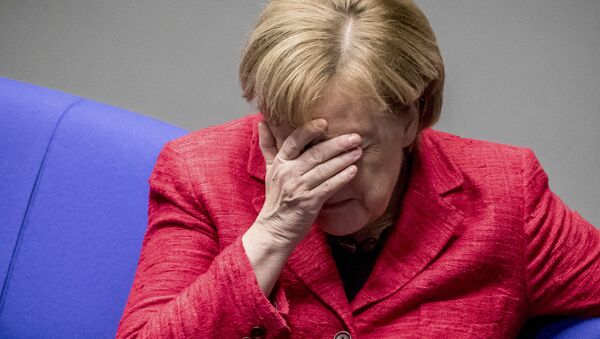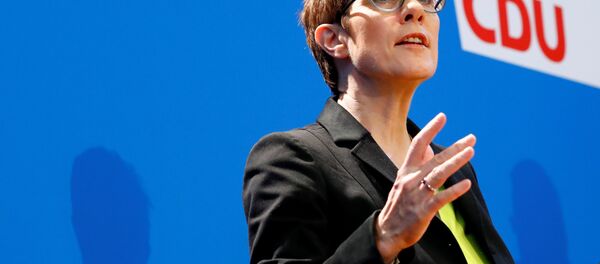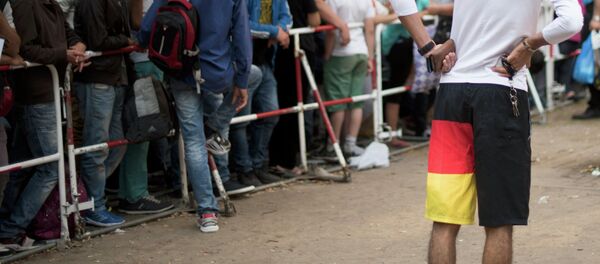There is a very real possibility that German Chancellor Angela Merkel may soon step down not only as the Christian Democratic Union (CDU) leader but also as the head of government, Daniele Pozzati, a Munich-based Italian journalist and political observer, told Sputnik, suggesting that it may happen "within seven months or so."
"Why exactly 7 months? Because on May 26, 2019 no fewer than 10 German regions will vote in local elections [Landtag and Kreistage], just as Bavaria and Hesse did last month," the political observer pointed out.
Citing a recent prognosis for the upcoming May 2019 Landtag election in Bremen, Pozzati highlighted that the CDU is expected to get only 16 per cent of the vote. The dramatic loss of the ruling party's popularity is typical among most of the regions of the country, he noted.
#Bürgerschaftswahl #Bremen #HBWahl #LTWHB #LTW19#SPD 19% | #CDU 16% | #GRÜNE 23% | DIE #LINKE 14% | #FDP 10% | #AfD 10% | #BIW 3% | Andere 5%
— PrognosUmfragen (@PrognosUmfragen) 8. November 2018
"If defeat in one admittedly key region like Bavaria was enough for Merkel to step down as CDU party leader, imagine the upheaval should her party lose several seats across 10 regions, with two years to go until the next general elections," the political observer opined, emphasizing that on the same day, Germany will vote — like all other EU countries — for the European Parliament.
Merkel earlier clarified that she intends to persevere in the position of German chancellor until the expiration of her term in September 2021. However, according to the political observer, clouds are increasingly gathering on her horizon.
"Short of a political miracle, Merkel's time as chancellor will be over by next summer," Pozzati foresees.
Merkel's Time as CDU Leader is Over
Likewise, on November 12, Horst Seehofer confirmed that he would stand down as leader of the CSU. "I will resign from the party leadership. That decision is final," he stated, specifying that he will continue to serve as interior minister.
"Merkel's time as CDU leader is over, and she knows it," Pozzati said. "Already in 2017, when she announced her decision to run for a fourth term as chancellor, she must have known it would have been the last one."
According to the journalist, "in a way, she had no choice but to step down as CDU party leader." Pozzati believes that from her perspective, it must be the least risky option. "For one, she will avoid a plain defeat," he suggested. "She's just stepping down, you see, it's her decision. But Merkel is also trying to preempt any pressure on her to resign as chancellor."
Bundestag Reshuffle is Unlikely
The journalist has drawn attention to the fact that "conservative Friedrich Merz, the leading candidate to succeed Angela Merkel, praised the once-anarchic green party as 'very urbane, very open, very liberal and certainly able to cooperate'."
"See? The grand-coalition is (almost) dead, long live the grand-coalition. With the pro-immigration, former anarchist, now establishment-loving Green party likely to replace pro-immigration, former leftist, now capitalist-loving Social Democrat party (SPD)," Pozzati suggested.
He recalled that the German Green party "showed its real face" when then green foreign minister and deputy chancellor Joschka Fischer agreed to the NATO bombing of Serbia in 1999. The journalist added that the German Greens are largely regarded as "hardliners" when it comes to anti-Russian sanctions. Besides, the German Green party is also very "progressive," he noted. Given all of the above, it would fit into the ruling coalition perfectly well, the journalist presumed.
"So I think you're quite right in talking of a 'reshuffle' — for there certainly won't be any real change, not until German voters leave their taboos behind, and choose parties that represent a real challenge to the status quo: the far-right Alternative for Germany (AfD) and the die-hard leftist Die Linke," Pozzati concluded.
The views and opinions expressed by the contributors do not necessarily reflect those of Sputnik.



